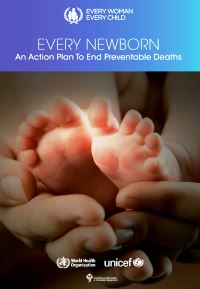 Dr Peter Salama, Regional Director of UNICEF/Middle East and North Africa; Dr Ala Alwan, WHO Regional Director for the Eastern Mediterranean, Mr Daniel Baker, UNFPA/Arab States sign a joint statement on accelerating the reduction of neonatal mortalityAmman, 24 April 2016 – The World Health Organization (WHO), UNFPA (United Nations Population Fund) and UNICEF are joining efforts to support Arab countries and Afghanistan, Islamic Republic of Iran, and Pakistan to reduce neonatal mortality and improve the quality of health care services provided to newborns and mothers. Last year, more than 450 000 newborn children in the first month of life died in these countries, accounting for more than half of all deaths in children under-5 years old.
Dr Peter Salama, Regional Director of UNICEF/Middle East and North Africa; Dr Ala Alwan, WHO Regional Director for the Eastern Mediterranean, Mr Daniel Baker, UNFPA/Arab States sign a joint statement on accelerating the reduction of neonatal mortalityAmman, 24 April 2016 – The World Health Organization (WHO), UNFPA (United Nations Population Fund) and UNICEF are joining efforts to support Arab countries and Afghanistan, Islamic Republic of Iran, and Pakistan to reduce neonatal mortality and improve the quality of health care services provided to newborns and mothers. Last year, more than 450 000 newborn children in the first month of life died in these countries, accounting for more than half of all deaths in children under-5 years old.
More than 100 maternal and child health experts, nongovernmental organizations, academics and researchers are taking part in a 3-day joint WHO/UNICEF/UNFPA meeting in Amman, Jordan, from 24 April. Participants are discussing the main challenges to ensuring the well-being of newborn babies and plans to provide effective health care to all newborns in accordance with the “Every Newborn Action Plan”.
Between 1990 and 2015, maternal mortality in the Region decreased by over half (54%) while under-5 mortality decreased by 48%. The largest challenge remains in the period at or around birth, with more than half of under-5 deaths occurring in the first 28 days of life. Although deaths in this neonatal period have fallen by 37%, it has been at a slower rate than for older age groups.
During the meeting, the regional directors of WHO, UNFPA and UNICEF signed a joint statement on accelerating the reduction of neonatal mortality. They will pledge their continuing support to governments across the Region to end preventable maternal, newborn and child deaths by 2030.
In the joint statement, the 3 organizations have committed to: working with governments to strengthen their leadership and capacity to maintain health services in humanitarian emergencies; building national capacity that enables Member States to mobilize a sufficient and skilled workforce, and providing essential supplies and equipment for maternal and newborn health care; strengthening the skills of the midwifery workforce and community health workers to facilitate better quality of newborn health care; and strengthening management capacity and financial resources to sustain strong health systems for high-quality service delivery.
By the end of the meeting, participants will agree on a set of recommendations that will support countries to develop and update their national reproductive, maternal, neonatal and child strategic health plans.
Related links
 Every newborn action plan (ENAP) | ENAP progress report May 2015
Every newborn action plan (ENAP) | ENAP progress report May 2015
For more information, please contact:
UNFPA
Dr Mohamed Afifi
Mobile: +201022426668
UNICEF
Juliette Touma
Mobile: +962-79-867-4628
WHO
Rana Sidani
Mobile: +20 1099756506


